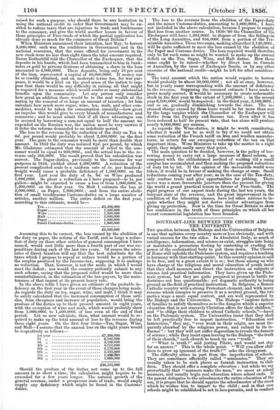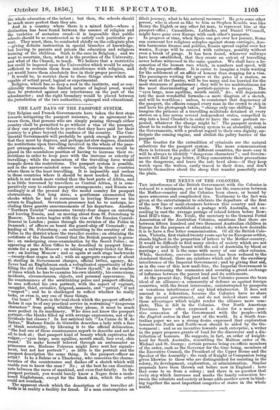• BOUNDARY-LINE BETWEEN THE CHURCH AND THE UNIVERSITY.
Tin question between the Bishops and the Universities of Belgium is one that agitates every country more or less obviously, and with varied success for the two sides. In Absolutist Italy, so much of intelligence information, and science as exist, struggles into being or maintains a precarious footing by contesting or evading the power of the ecclesiastical body to put them down. The Church of Rome still upholds the Ptolemaic system, and requires a teaching in harmony with that starting-point. In this country opinion is said to be free and to a great extent it is so ; but those among us who have charge of the religious and moral education of youth insist that they shall measure and direct the instruction on subjects of science and practical information. They have given up the Ptole- maic system, but they are quite prepared at present to battle for doctrines not less questionable : yet dogmatic authority is losing ground on the field of practical instruction. In Belgium, a Roman Catholic country with a strong Protestant element, and with many reasons which conspire to preserve it as a neutral ground, the two parties wage a more equal contest, and are well represented by the Bishops and the Universities. The Bishops "implore fathers of families to satisfy themselves as to the dangers which a superior education that is not sincerely Christian offers for their children," and "to oblige their children to attend Catholic schools,"—based on the Ptolemaic system. The Universities insist that they shall be left practically free to impart instruction. "Education and instruction," they say, "ever weak in their origin, are most fre- quently absorbed by the religious power, and submit to its in- fluence " : but they will not suffer dogmatism to invade the domain of science ; while they insist upon leaving to the Bishops "the truth of their church," each church to teach its own "truth."
"'What is truth ?' said jesting Pilate, and would not stay for an answer." This is the whole point. "Will you allow chil- dren to grow up ignorant of the truth ?" asks the clergyman.
The difficulty arises in part from the imperfection of schools. They are sometimes affectedly called "seminaries." They are usually taken to be such places as furnish instruction to chil- dren. They should offer a complete education ; but while we say proverbially that "manners make the man," we sneer at school manners, and usually begin real education where school ends. If• the parent delegates to the schoolmaster the entire education of the son, it is proper that he should apprize the schoolmaster of the creed which he wishes him to impart to the child ; and in that case schools might be established to act in loco parentis, and to conduct
the whole education of the infant ; but then, the schools should be much more perfect than they are.
And in a country where there is a mixed faith—where a distinction has been found between the essence of religion and the varieties of sectarian creed—it is impossible that public schools should be so constructed as to satisfy each particular pa- rent. They must, then, be conducted chiefly on the collegiate plan —giving definite instruction in special branches of knowl
but leaving to parents and priests the education and religious training of the children. Such is the case in Belgium ; and we want to ascertain, then, what it is the province of the University, and what of the Church, to teach. We believe that a restrictive law could be imposed upon the Universities which would be amply sufficient to restrain them from interference with religion, and yet would leave them absolutely free in their proper province. It would be, to restrict them to those things alone which are capable of actual proof, logical or experimental. Meligion, which has so deep a root in the instincts, and so con- siderably transcends the limited nature of logical proof, would then be protected against any interference on the part of the schoolmaster ; and the right boundary would be placed between the jurisdiction of the two authorities, episcopal and educational.



























 Previous page
Previous page